Unlocking Performance: How to Choose the Right Crankshaft Supplier for Your Needs
To be honest, when you think about the heart of an engine, what comes to mind? For many, it's the pistons or the cylinders. But the unsung hero, the component that truly translates the explosive power of combustion into rotational motion, is the crankshaft. This vital part ensures your engine runs smoothly, efficiently, and powerfully. Without a high-quality crankshaft, even the most meticulously designed engine is just a collection of inert parts. This is precisely why selecting the right Crankshaft supplier is not just important; it's absolutely critical for any business involved in engine manufacturing, automotive repair, or heavy machinery.
Have you ever wondered about the immense forces a crankshaft endures? It's subjected to incredible torsional stress, bending moments, and fatigue cycles, all while rotating at thousands of revolutions per minute. This demands extreme precision in manufacturing, superior material properties, and rigorous quality control. Frankly speaking, the performance and longevity of your equipment hinge directly on the quality of its crankshaft. In this comprehensive guide, we'll delve deep into what makes a great Crankshaft supplier, the factors to consider, and how to forge a partnership that drives success.
The Critical Role of a Crankshaft in Modern Machinery
The crankshaft is, without exaggeration, the backbone of any internal combustion engine. It converts the linear reciprocating motion of the pistons into rotational motion, which then powers everything from vehicle wheels to industrial pumps and generators. Its design and integrity directly impact an engine's power output, fuel efficiency, vibration levels, and overall lifespan. From small automotive engines to massive marine propulsion systems and industrial power plants, the crankshaft's function remains consistently crucial.
Precision Engineering: The Heartbeat of an Engine
The manufacturing of a crankshaft is a testament to precision engineering. It typically begins with high-grade steel alloys, often forged or cast, to create a blank that possesses the necessary strength and durability. Forging, in particular, aligns the grain structure of the metal, enhancing its fatigue resistance – a critical property given the stresses a crankshaft undergoes. After the initial shaping, the blanks undergo extensive machining processes, including turning, milling, and grinding, to achieve incredibly tight tolerances on critical dimensions like journal diameters, throws, and balance weights.
It's worth noting that surface finish and heat treatment are equally vital. Processes like nitriding or induction hardening are often applied to the bearing surfaces to increase wear resistance. Finally, each crankshaft must be meticulously balanced to prevent vibrations that could otherwise lead to premature wear or catastrophic failure. The entire process, from raw material to finished product, requires an exceptional level of expertise and state-of-the-art equipment. A reputable Crankshaft supplier invests heavily in these areas to ensure every product meets the highest standards.
Beyond Automotive: Diverse Applications
While often associated with cars and trucks, the demand for high-quality crankshafts extends far beyond the automotive sector. Marine engines, from small outboards to colossal container ship powerplants, rely on robust crankshafts designed to withstand continuous operation in harsh environments. In the industrial sector, crankshafts are integral to compressors, pumps, generators, and heavy construction equipment. Even in power generation, large diesel or gas engines that drive electrical generators depend on precisely engineered crankshafts for reliable, continuous power output. The specific requirements for each application, such as material strength, size, and design, necessitate a supplier with broad capabilities and a deep understanding of diverse industrial needs.
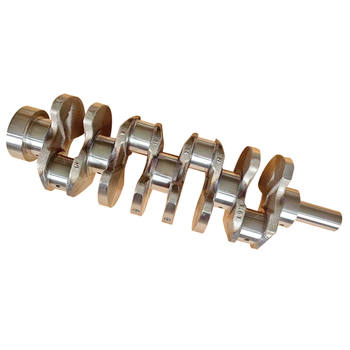
What Defines a Top-Tier Crankshaft Supplier?
Choosing a Crankshaft supplier isn't just about finding someone who can deliver a part; it's about securing a partner who can consistently provide components that meet your exact specifications and performance demands. Many experts agree that several core attributes distinguish a top-tier supplier from the rest.
Quality Assurance and Material Excellence
The foundation of any reliable crankshaft is the quality of its raw materials. A leading supplier will have stringent material sourcing policies, often working with certified steel mills to ensure consistent composition and purity. They will also implement comprehensive quality assurance protocols throughout their manufacturing process. This includes:
- Material Testing: Verifying the chemical composition and mechanical properties of incoming raw materials.
- In-process Inspections: Regular checks at every stage of manufacturing, from forging to machining and heat treatment.
- Non-destructive Testing (NDT): Techniques like magnetic particle inspection, ultrasonic testing, and eddy current testing to detect internal flaws or surface cracks without damaging the part.
- Dimensional Metrology: Using advanced measuring equipment (CMMs, laser scanners) to ensure all dimensions are within specified tolerances.
- Certifications: Adherence to international quality standards such as ISO 9001, IATF 16949 (for automotive), or aerospace certifications, demonstrating a commitment to quality management.
A supplier's commitment to these practices directly translates into the reliability and longevity of their crankshafts.
Manufacturing Capabilities and Technology
The ability to produce high-quality crankshafts consistently requires significant investment in advanced manufacturing technology. Look for a Crankshaft supplier that utilizes:
- Advanced Forging/Casting Facilities: Modern presses and furnaces for optimal material grain structure.
- Multi-axis CNC Machining: Precision machining centers capable of holding tight tolerances and producing complex geometries. This is especially crucial for custom crankshaft fabrication.
- Robotics and Automation: To ensure repeatability, reduce human error, and improve efficiency.
- Specialized Grinding and Polishing Equipment: For achieving the critical surface finishes required for bearing journals.
- Dynamic Balancing Machines: Essential for minimizing vibrations and ensuring smooth engine operation.
- Heat Treatment Facilities: In-house capabilities for processes like induction hardening or nitriding, ensuring optimal material hardness and wear resistance.
A supplier with a broad range of in-house capabilities can offer greater control over the entire production process, leading to higher quality and more consistent products.
Supply Chain Reliability and Logistics
In today's fast-paced global economy, timely delivery and efficient logistics are just as important as product quality. A reliable Crankshaft supplier understands the critical nature of their components to your production schedule. They should have:
- Robust Supply Chain Management: Systems in place to manage raw material procurement, production scheduling, and inventory effectively.
- Global Shipping Capabilities: Experience with international logistics, customs, and freight forwarding if you operate across borders.
- Contingency Planning: Measures to mitigate risks such as material shortages, production delays, or transportation disruptions.
- Clear Communication: Transparency regarding lead times, order status, and any potential issues.
A supplier who can consistently meet deadlines and adapt to changing demands is invaluable.
Navigating the Landscape: Choosing the Right Crankshaft Supplier
With numerous manufacturers and distributors in the market, how do you narrow down your options and select the ideal Crankshaft supplier for your specific needs? It requires a methodical approach and a clear understanding of your own requirements.
Assessing Experience and Reputation
In my experience, one of the most reliable indicators of a supplier's quality is their track record. Look for companies with a long history in the industry and a strong reputation for excellence.
- Industry Experience: How long have they been in business? Do they specialize in your specific industry (e.g., automotive crankshaft manufacturing, marine, heavy industrial)?
- Client Testimonials and References: Ask for references from existing clients, especially those with similar needs to yours. What do their customers say about their product quality, delivery, and customer service?
- Case Studies: Do they have examples of successful projects or complex challenges they've overcome?
- Market Standing: Are they recognized as a leader or innovator in the crankshaft manufacturing sector?
A supplier with a proven history of delivering high-quality products and maintaining strong client relationships is often a safer bet.
Customization and Technical Support
Not all crankshafts are off-the-shelf items. Many applications require unique designs, specific material properties, or specialized finishes. A truly valuable Crankshaft supplier offers:
- Design and Engineering Support: The ability to collaborate on custom designs, optimize existing designs for performance or cost, and provide technical drawings and specifications.
- Prototyping Capabilities: For new product development or testing innovative solutions.
- Material Expertise: Guidance on selecting the most appropriate materials for your application's specific operating conditions (e.g., high temperature, corrosive environments).
- After-Sales Support: Technical assistance, troubleshooting, and warranty support.
The level of technical partnership a supplier can offer can significantly reduce your development time and improve your product's overall performance.
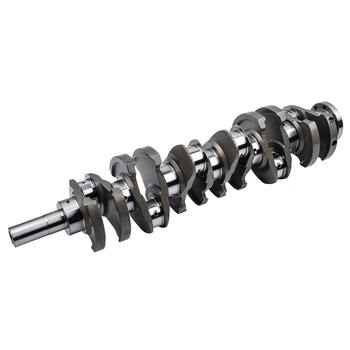
Cost vs. Value: A Balanced Approach
It's tempting to choose the cheapest option, but when it comes to critical components like crankshafts, this can be a costly mistake in the long run. A lower initial price might lead to:
- Frequent Failures: Due to inferior materials or manufacturing processes, leading to costly downtime and repairs.
- Reduced Performance: Suboptimal design or balancing can impact engine efficiency and power output.
- Shorter Lifespan: Requiring more frequent replacements, increasing total cost of ownership.
- Reputational Damage: If your end products fail due to component quality.
Instead, focus on the overall value proposition. Consider the supplier's quality, reliability, technical support, and the potential for long-term partnership. A slightly higher upfront cost for a superior product can result in significant savings and enhanced performance over the operational life of your equipment.
The Future of Crankshaft Manufacturing and Supply
The world of manufacturing is constantly evolving, and crankshaft production is no exception. Staying abreast of these changes is crucial for both suppliers and their clients.
Advanced Materials and Manufacturing Techniques
Research and development continue to push the boundaries of what's possible. We're seeing advancements in:
- Lightweight Materials: Exploration of advanced alloys and composites to reduce weight without compromising strength, crucial for fuel efficiency and performance.
- Additive Manufacturing (3D Printing): While not yet mainstream for production crankshafts, 3D printing of metal components holds promise for rapid prototyping, complex geometries, and specialized, low-volume applications.
- Smart Manufacturing (Industry 4.0): Integration of IoT sensors, data analytics, and AI into the production line for real-time monitoring, predictive maintenance, and optimized processes. This can lead to even higher precision and efficiency in industrial crankshaft solutions.
A forward-thinking Crankshaft supplier will be investing in these areas, ensuring they remain at the cutting edge of the industry.
Sustainability and Environmental Responsibility
As global environmental concerns grow, the manufacturing sector is under increasing pressure to adopt more sustainable practices. A responsible Crankshaft supplier will likely focus on:
- Energy Efficiency: Implementing energy-saving measures in their facilities.
- Waste Reduction: Minimizing scrap, recycling materials, and optimizing processes to reduce waste generation.
- Responsible Sourcing: Ensuring raw materials are sourced ethically and sustainably.
- Reduced Emissions: Investing in cleaner production technologies.
Partnering with an environmentally conscious supplier can also enhance your own company's sustainability profile.
Global Trends and Market Dynamics
The shift towards electric vehicles (EVs) is undoubtedly a major trend impacting the automotive industry. While this may reduce demand for traditional internal combustion engine (ICE) crankshafts in the long term, it's important to remember that ICEs will remain prevalent in many sectors for decades to come, especially in heavy-duty transport, marine, and industrial applications. Moreover, the expertise in precision manufacturing and material science developed for crankshafts can often be leveraged for components in new energy systems. A versatile Crankshaft supplier will be adapting to these market shifts, diversifying their offerings, and exploring new opportunities.

Partnering for Success: The Strategic Advantage of a Great Crankshaft Supplier
In conclusion, the crankshaft is far more than just a metal component; it's the dynamic core of countless machines that power our world. The decision of which Crankshaft supplier to partner with is a strategic one that can profoundly impact your product quality, operational efficiency, and competitive edge.
It's not merely about purchasing a part; it's about building a relationship with a company that understands your needs, shares your commitment to quality, and possesses the technical prowess and logistical capabilities to support your long-term goals. By prioritizing quality assurance, manufacturing excellence, supply chain reliability, and a willingness to offer technical support and customization, you can ensure you're making an investment that pays dividends.
What's your biggest challenge when sourcing critical engine components? Finding a truly reliable Crankshaft supplier can transform that challenge into a significant advantage, ensuring your engines and machinery run with the power, precision, and longevity they were designed for.
For more detailed information, please visit our official website:Crankshaft supplier
About the author: Dr. Alistair Finch is a veteran mechanical engineer with over 25 years of experience specializing in powertrain components and advanced materials. His expertise spans automotive, marine, and heavy industrial applications, with a particular focus on the design, manufacturing, and quality assurance of critical engine parts like crankshafts. He frequently consults with leading manufacturers on supply chain optimization and advanced engineering solutions, making him a trusted voice in the field of precision component sourcing.
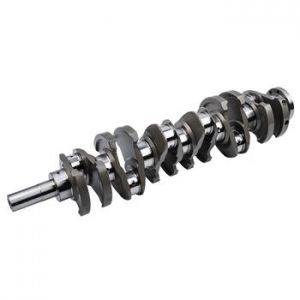 The Unseen Powerhouse: Unravel
The Unseen Powerhouse: Unravel
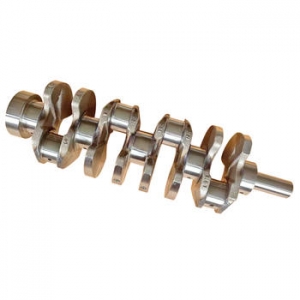 Unlocking Performance: How to
Unlocking Performance: How to
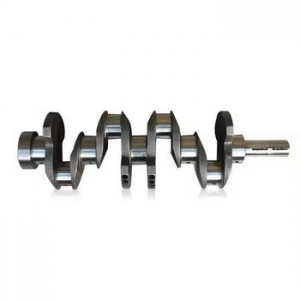 Beyond the Blueprint: A Deep D
Beyond the Blueprint: A Deep D
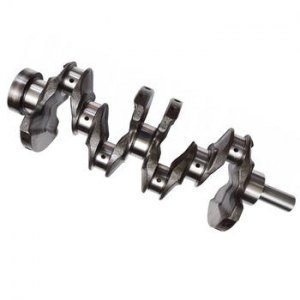 Crankshaft manufacturer
Crankshaft manufacturer
